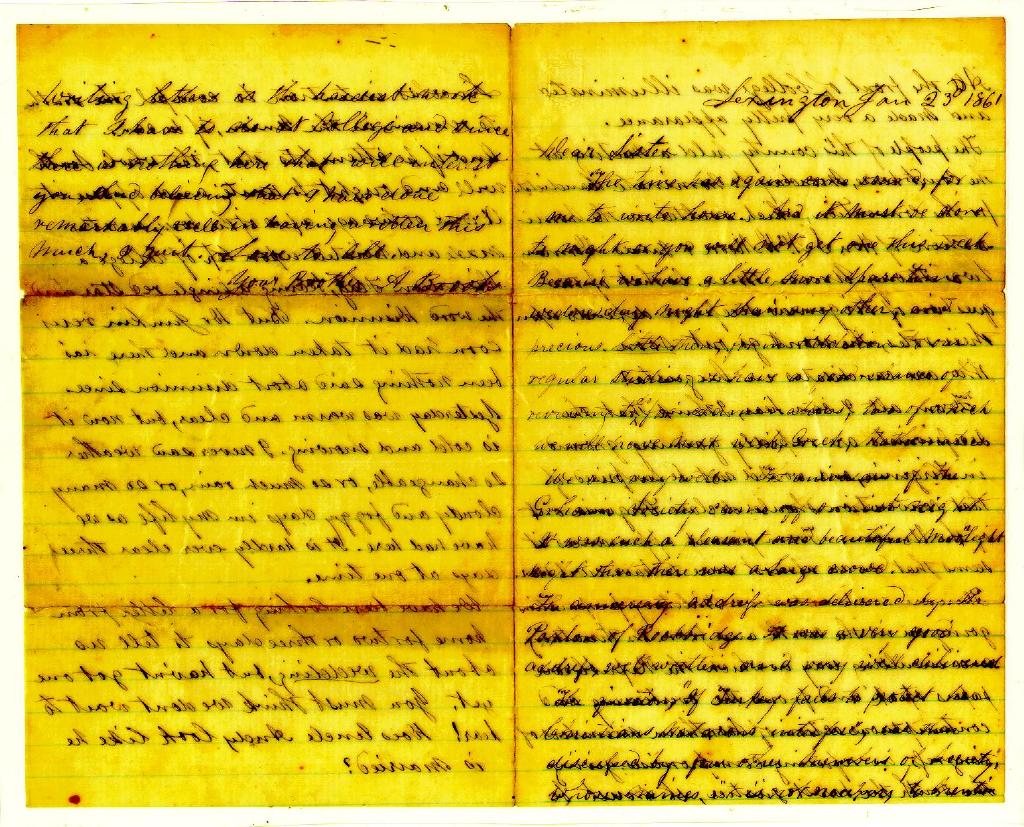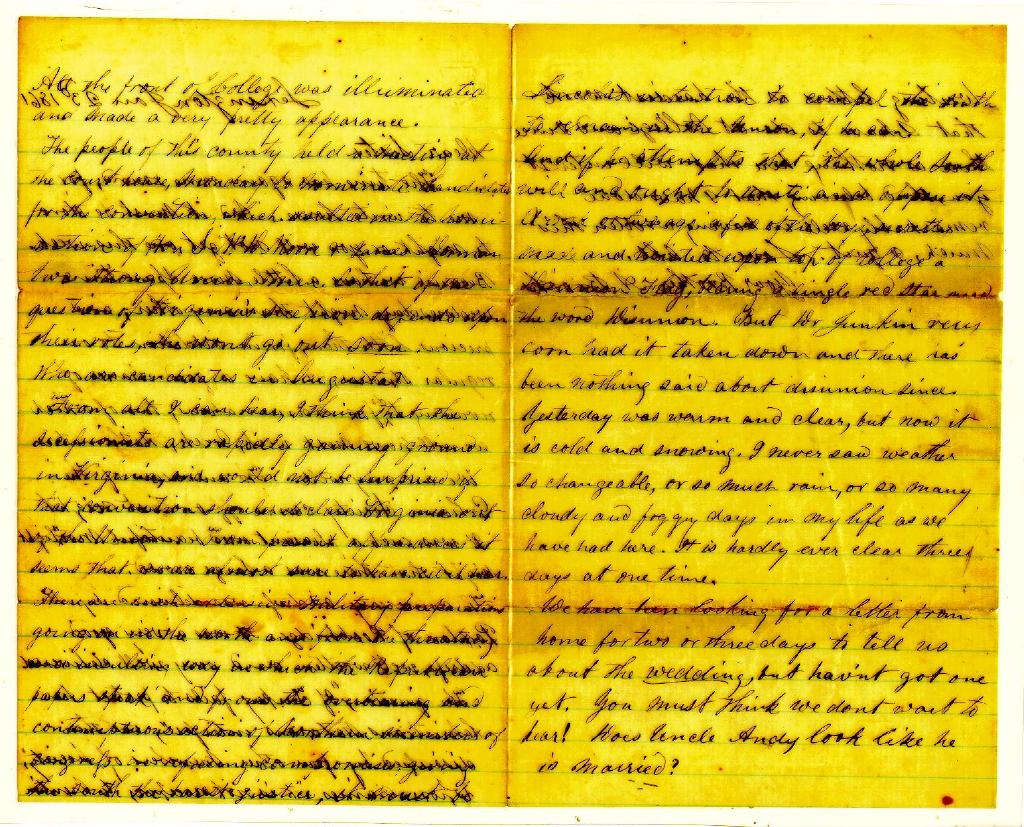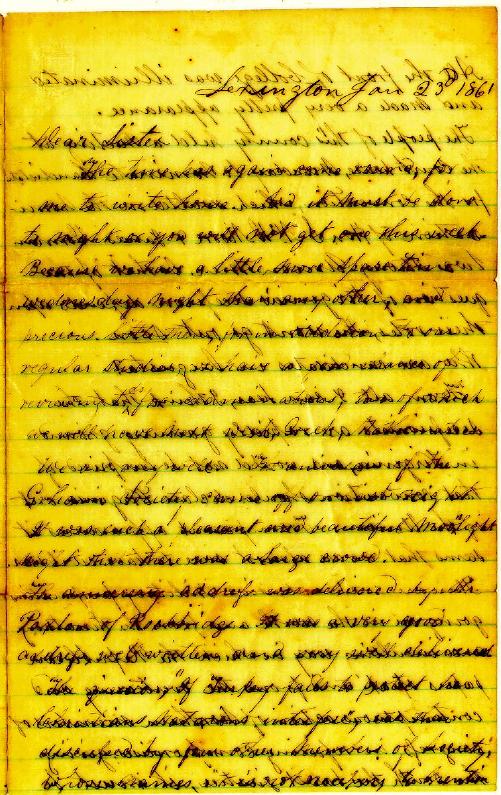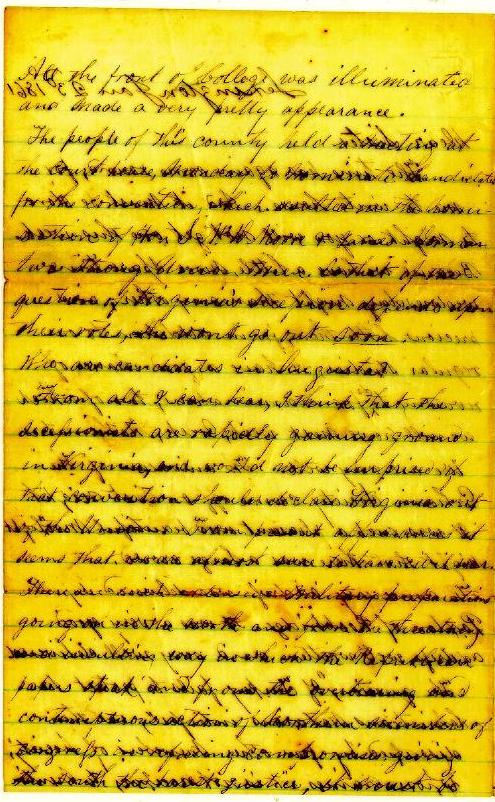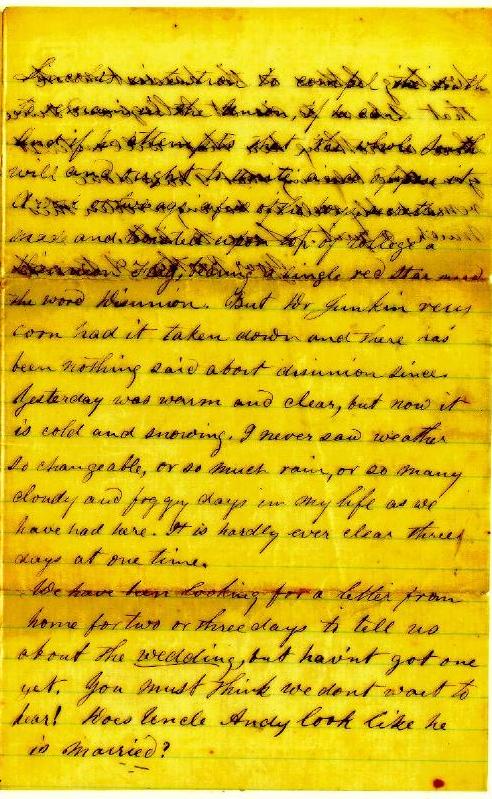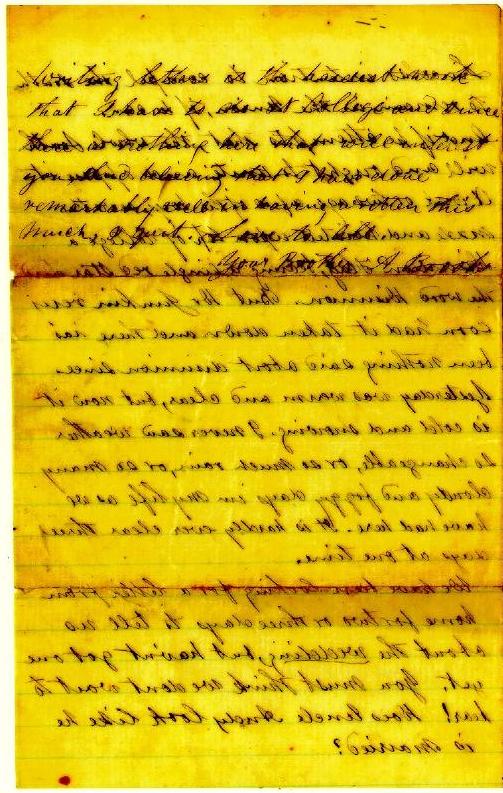Letter to Mary Susan Brooks
Summary
ALS .pp January 23, 1861 Andrew Brooks to Mary Susan Brooks, January 23, 1861 Andrew Brooks reports on the recent election in Lexington, Virginia, in which two Union men were elected to the state convention. Despite this outcome, Brooks predicts that Virginia will secede.
Washington College
Dear Sister,
The time has again come round for
me to write home. And it must be done
to night or you will not get one this week.
Because we have a little more spare time
Wednesday night than any other, and
precious little then, for in addition to our
regular studies we have a poor chance to
do for examinations; two of which
we will have next week, Greek, Mathematics.[1]
We are very well. The anniversary of the
Graham Society [2] came off on last night.
It was such a pleasant and beautiful moonlight
that there was a large crowd.
The anniversary address was delivered by Mr.
Paxton of Rockbridge.[3] It was a very good
address, well written and very well delivered.
The question, "If Turkey fails to protect her
Christians should nations interfere" was then
discussed by four other members of Society,
whose names it is not necessary to mention.
All the front of the college was illuminated
and made a very pretty appearance.
The people of this county held a meeting at
the Court house, Monday to nominate candidates
for the convention which resulted in the nomi-
nation of S McD Moore and James Dorman,
two strong Union men, so that if the
question of Virginia's secession depends upon
their votes, she wont go out soon. Who are candidates in Augusta?[4]
From all I can hear, I think that the
secessionists are rapidly gaining ground
in Virginia, and would not be surprised if
that convention should declare Virginia out
of the Union. From present appearances it
seems that we are almost sure to have civil war.
There are such extensive military preparations
going on in the north and from the threatening
and insulting way in which the Republican
papers and from the overbearing and
contemptuous actions [unclear: ]
of Congress in refusing compromises giving
the South the barest justice, it must be Lincoln's intention to compel the South
to remain in the Union, if he can.
And if he attempts that, the whole South
will and ought to unite and oppose it.
A week or two ago, a few of the boys secretly
made and hoisted upon top of College
a Disunion Flag, bearing a single red star and
the word Disunion. But Dr. Junkin very
soon had it taken down and there has
been nothing said about disunion since.[5]
Yesterday was warm and clear, but now it
is cold and snowing. I never saw weather
so changeable, or so much rain, or so many
cloudy and foggy days in my life as we
have had here. It is hardly ever clear three
days at one time.
We have been looking for a letter from
home for two or three days to tell us
about the wedding, but haven't got one
yet. You must think we don't want to
hear! Does Uncle Andy look like he
is married?[6]
Writing letters is the hardest work
that I have to do at College and since
there is nothing here that will interest
you, and believing that I have done
remarkably well in having written this
much, I quit.
Love to all,
your brother
A. Brooks
Footnotes
- 1
Andrew Brooks attended Washington College (present day Washington and Lee University) which was located in Lexington, Virginia. During the antebellum period, the typical student at Washington College studied the classics, mathematics, physical sciences, and rhetoric (Crenshaw 80-81). In the months leading up to the war, the issue of Virginia's secession was hotly debated amongst the students and faculty (Bean, 3-9).
- 2
The Graham Philanthropic Society, which was founded in 1809, was a literary and debating society that held weekly debates, hosted notable speakers, and maintained a library. Each January, the Society observed its anniversary with a special celebration (Crenshaw 106-110).
- 3
Andrew Brooks may be referring to James G. Paxton, editor of the Lexington Valley Star and a Democratic delegate to the General Assembly (Crenshaw 67-68). "Mr. Paxton" could also refer to Col. Frank Paxton, an alumnus of Washington College (Turner, 124).
- 4
Verifying Andrew Brooks' comments, James White wrote on January 23 that "a convention of conservatives" from Rockbridge County had nominated Samuel McDowell Moore and James Dorman as delegates to the State Convention that met to decide whether to secede. On February 5, White reported that Moore and Dornan had won those seats (Turner 34-35). At the Virgina Convention, Dornan supported and Moore opposed secession; the secessionists won with a vote of 85 to 45 (Turner 38). Both and Moore and Dorman were members of the Virginia legislature; Dorman was also an alumnus of Washington College. (Crenshaw 63-4; 67).
- 5
Rev. George Junkin, the president of Washington College, was born in Pennsylvania and supported the Union, even though he owned slaves. Junkin, a Whig, argued that the introduction of slavery into the territories was a non-issue and that secession could be avoided by regarding it as such. According to Junkin, Virginia initiated "a rebellion without cause" when it joined the Confederacy (quoted by Bean, 5). Junkin preached actively and passionately against secession and silenced students who delivered oratories in support of it. His actions and attitudes caused students to rebel, as they scribbled graffiti calling Junkin "a Pennsylvania abolitionist" on the columns of a building and flew flags celebrating the Confederacy over a statue of George Washington. When, after Virginia seceded, the faculty overruled Junkin's efforts to remove a Southern flag, he resigned and returned to Pennsylvania (Bean 6-7). Not all of his family left with him; Stonewall Jackson was his son-in-law.
- 6
On Janury 17, 1861, Andrew Stuart (the brother of Andrew Brooks' mother Eleanor Tate Stuart Brooks) married Sarah McClure near Greenville, Augusta County (The Republican Vindicator, February 1, 1861, p. 3). According to the 1860 census, Sarah McClure was 36 in 1860; her father was a fairly wealthy farmer.
